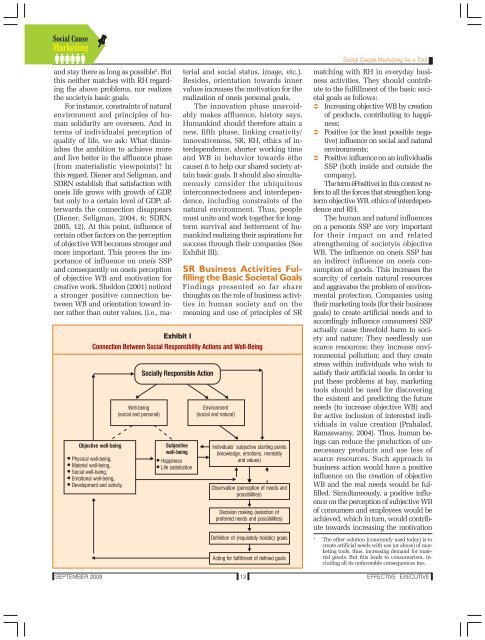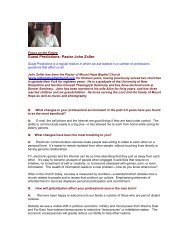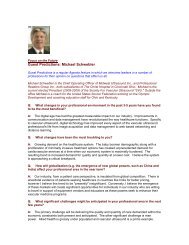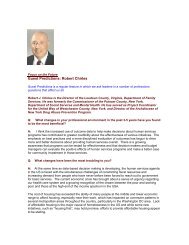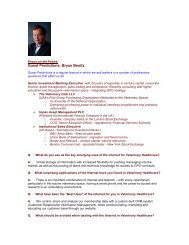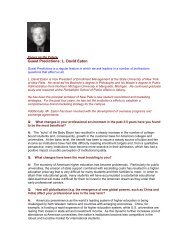Social Cause Marketing - The Regis Group Inc
Social Cause Marketing - The Regis Group Inc
Social Cause Marketing - The Regis Group Inc
You also want an ePaper? Increase the reach of your titles
YUMPU automatically turns print PDFs into web optimized ePapers that Google loves.
Exhibit I<br />
Connection Between <strong>Social</strong> Responsibility Actions and Well-Being<br />
Objective well-being<br />
● Physical well-being,<br />
● Material well-being,<br />
● <strong>Social</strong> well-being,<br />
● Emotional well-being,<br />
● Development and activity.<br />
Well-being<br />
(social and personal)<br />
<strong>Social</strong>ly Responsible Action<br />
Subjective<br />
well-being<br />
● Happiness<br />
● Life satisfaction<br />
and stay there as long as possible 2 . But<br />
this neither matches with RH regarding<br />
the above problems, nor realizes<br />
the societyís basic goals.<br />
For instance, constraints of natural<br />
environment and principles of human<br />
solidarity are overseen. And in<br />
terms of individualsí perception of<br />
quality of life, we ask: What diminishes<br />
the ambition to achieve more<br />
and live better in the affluence phase<br />
(from materialistic viewpoints)? In<br />
this regard, Diener and Seligman, and<br />
SDRN establish that satisfaction with<br />
oneís life grows with growth of GDP,<br />
but only to a certain level of GDP; afterwards<br />
the connection disappears<br />
(Diener, Seligman, 2004, 6; SDRN,<br />
2005, 12). At this point, influence of<br />
certain other factors on the perception<br />
of objective WB becomes stronger and<br />
more important. This proves the importance<br />
of influence on oneís SSP<br />
and consequently on oneís perception<br />
of objective WB and motivation for<br />
creative work. Sheldon (2001) noticed<br />
a stronger positive connection between<br />
WB and orientation toward inner<br />
rather than outer values, (i.e., material<br />
and social status, image, etc.).<br />
Besides, orientation towards inner<br />
values increases the motivation for the<br />
realization of oneís personal goals.<br />
<strong>The</strong> innovation phase unavoidably<br />
makes affluence, history says.<br />
Humankind should therefore attain a<br />
new, fifth phase, linking creativity/<br />
innovativeness, SR, RH, ethics of interdependence,<br />
shorter working time<br />
and WB in behavior towards ëthe<br />
causeí ñ to help our shared society attain<br />
basic goals. It should also simultaneously<br />
consider the ubiquitous<br />
interconnectedness and interdependence,<br />
including constraints of the<br />
natural environment. Thus, people<br />
must unite and work together for longterm<br />
survival and betterment of humankind<br />
realizing their aspirations for<br />
success through their companies (See<br />
Exhibit III).<br />
SR Business Activities Fulfilling<br />
the Basic Societal Goals<br />
Findings presented so far share<br />
thoughts on the role of business activities<br />
in human society and on the<br />
meaning and use of principles of SR<br />
Environment<br />
(social and natural)<br />
Individuals’ subjective starting points<br />
(knowledge, emotions, mentality<br />
and values)<br />
Observation (perception of needs and<br />
possibilities)<br />
Decision making (selection of<br />
preferred needs and possibilities)<br />
Definition of (requisitely holistic) goals<br />
Acting for fulfillment of defined goals<br />
matching with RH in everyday business<br />
activities. <strong>The</strong>y should contribute<br />
to the fulfillment of the basic societal<br />
goals as follows:<br />
<strong>Inc</strong>reasing objective WB by creation<br />
of products, contributing to happiness;<br />
Positive (or the least possible negative)<br />
influence on social and natural<br />
environments;<br />
<br />
<strong>Social</strong> <strong>Cause</strong> <strong>Marketing</strong> As a Tool<br />
Positive influence on an individualís<br />
SSP (both inside and outside the<br />
company).<br />
<strong>The</strong> term ëPositiveí in this context refers<br />
to all the forces that strengthen longterm<br />
objective WB, ethics of interdependence<br />
and RH.<br />
<strong>The</strong> human and natural influences<br />
on a personís SSP are very important<br />
for their impact on and related<br />
strengthening of societyís objective<br />
WB. <strong>The</strong> influence on oneís SSP has<br />
an indirect influence on oneís consumption<br />
of goods. This increases the<br />
scarcity of certain natural resources<br />
and aggravates the problem of environmental<br />
protection. Companies using<br />
their marketing tools (for their business<br />
goals) to create artificial needs and to<br />
accordingly influence consumersí SSP<br />
actually cause threefold harm to society<br />
and nature: <strong>The</strong>y needlessly use<br />
scarce resources; they increase environmental<br />
pollution; and they create<br />
stress within individuals who wish to<br />
satisfy their artificial needs. In order to<br />
put these problems at bay, marketing<br />
tools should be used for discovering<br />
the existent and predicting the future<br />
needs (to increase objective WB) and<br />
for active inclusion of interested individuals<br />
in value creation (Prahalad,<br />
Ramaswamy, 2004). Thus, human beings<br />
can reduce the production of unnecessary<br />
products and use less of<br />
scarce resources. Such approach to<br />
business action would have a positive<br />
influence on the creation of objective<br />
WB and the real needs would be fulfilled.<br />
Simultaneously, a positive influence<br />
on the perception of subjective WB<br />
of consumers and employees would be<br />
achieved, which in turn, would contribute<br />
towards increasing the motivation<br />
2<br />
<strong>The</strong> other solution (commonly used today) is to<br />
create artificial needs with use (or abuse) of marketing<br />
tools, thus, increasing demand for material<br />
goods. But this leads to consumerism, including<br />
all its unfavorable consequences too.<br />
SEPTEMBER 2009<br />
13<br />
EFFECTIVE EXECUTIVE


